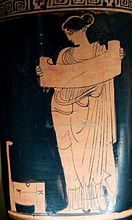
The Muses /ˈmjuːzᵻz/ (Ancient Greek: Μοῦσαι, Moũsai; perhaps from the o-grade of the Proto-Indo-European root *men- "think") in Greek mythology are the inspirational goddesses of literature, science, and the arts. They were considered the source of the knowledge embodied in the poetry, lyric songs, and myths that were related orally for centuries in these ancient cultures. They were later adopted by the Romans as a part of their pantheon.
In current English usage, "muse" can refer in general to a person who inspires an artist, writer, or musician.
== Number and names ==
The earliest known records...